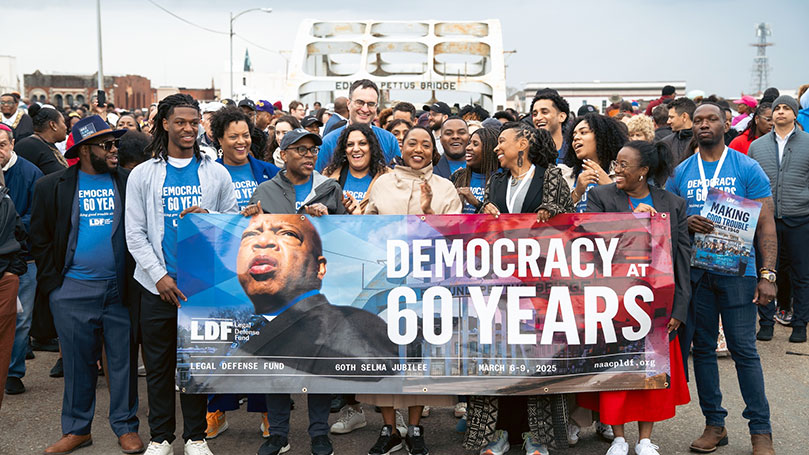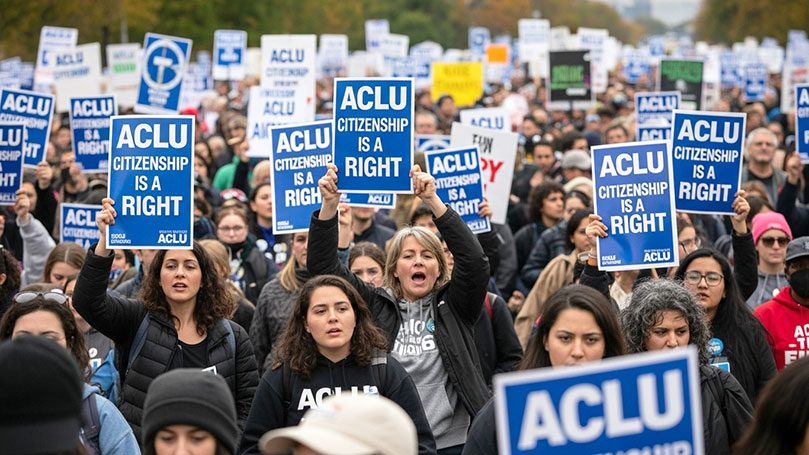
For working and oppressed people, including women, youth, and children in the United States today, resistance to Trump’s attempts to implement the Project 2025 agenda intensifies daily. As people become more clear about his truly inhumane agenda, Trump’s approval ratings plummet, and the resistance to the MAGA onslaught grows. In this context, the NAACP is holding its 116th Convention, and on July 17th a coalition is holding a Good Trouble Lives On protest.
The NAACP is an historically important grassroots organization advancing civil rights and social justice. They advocate, agitate, and litigate for the civil rights that are due to Black America in our cities, schools, workplaces, and courtrooms across the country. W.E.B. Du Bois, Ida B. Wells, Thurgood Marshall, and many other giants have helped shape the organization since its founding. That is an impressive legacy to build upon to strengthen the people’s resistance to systemic racism and anti-Black police violence. Far from being an isolated struggle, it is a necessary component of the all-out resistance by Black and Brown folks, immigrants, Asians, women, youth, organized labor, and all working and oppressed peoples in the United States against the destructive, anti-worker, racist MAGA agenda.
The NAACP’s 116th National Convention took place July 9–16, 2025 in Charlotte, N.C. Events setting the convention context included the recent large marches on May Day, No Kings Day, and the upcoming Good Trouble Lives On protests on July 17. Among the convention’s speakers were NAACP President and CEO Derrick Johnson, New York State Attorney General Letitia James — who won fraud charges against Donald Trump, Massachusetts Attorney General Andrea Joy Campbell, and others.
The Supreme Court’s 6–3 majority decision striking lower courts’ ability to issue nationwide injunctions are among the issues the NAACP has been forced to respond to. “It is an overly technical, heartless decision with real-world consequences for real people,” the NAACP has noted, saying that it has severely limited, if not eliminated, the possibility of using the judicial system to check Trump’s attacks.
The MAGA-led court made its decision in response to lower court actions aimed at stopping Trump’s deportations, attacks on the 14th Amendment, and other actions causing immediate and irreparable harm to working and oppressed people, including women in the U.S. In the words of the NAACP, the decision “prioritizes legal formalism over justice,” leaving immigrants, asylum seekers, and others “vulnerable to the whims of executive power, with no meaningful recourse.”
Justice Ketanji Brown Jackson was the lone dissenter. She charged the court with gifting Trump “the prerogative of sometimes disregarding the law,” putting “both our legal system and our system of government in grave jeopardy.”
The 14th Amendment’s birthright citizenship provision, which was the subject of a national injunction, was added to the Constitution specifically to roll back the heinous Dred v. Scott decision in which the Supreme Court declared that Black Americans were not, and could not be, U.S. citizens because, as “beings of an inferior order” they had “no rights which the white man was bound to respect.”

The onslaught against immigrants, including deportations of U.S. citizens and legal residents, is seen in some communities as excluding Black folks, but the attack on the 14th Amendment could deprive them of citizenship protections, too. Calling it “wrong and dangerous,” the NAACP warns against the move toward an even more racist and anti–working class legal system. “Fourteenth Amendment birthright citizenship belongs to everyone born on American soil — not just those lucky enough to file a lawsuit in the right place at the right time.”
They have also responded strongly against the Trump administration’s recent escalation of military conflict with Iran, mass raids and arrests of immigrants, and the roll-out of an exorbitant military parade — all while attempting to push through a deeply harmful domestic policy bill.
“This president is seeking to distract from the real issue: the passage of one of the worst budgets we’ve ever seen,” NAACP President and CEO Derrick Johnson said. “They want to disrupt how our taxpayer dollars are used … to enrich the already wealthy few. This garbage bill strips resources from those most in need, guts protections for vulnerable communities, and hands power to corporate interests in the name of government reform.”
As Johnson noted, war is once again being used as a tool of distraction, to great harm. “Lives are at stake, both home and abroad.”
The NAACP’s 116th convention marks the first time in more than 100 years that a sitting president has been excluded. This decision was made due Trump’s attack on civil rights. “He believes more in the fascist playbook than in the U.S. Constitution,” they wrote, adding, “It would be a waste of our time and energy to give a platform to fascism.”
The July 17th Good Trouble Lives On demonstrations emerge from the same tradition of struggle for civil rights as the NAACP. The organizers — which include 50501, Women’s March, American Civil Liberties Union, American Federation of Teachers, National Educators Association, the NAACP’s Legal Defense Fund, United Electrical workers, and other labor and civil rights organizations — are building on the legacy of Congressman John Lewis. “Good Trouble,” they say, is “the action of coming together to take peaceful, non-violent action to challenge injustice and create meaningful change.”
“The civil rights leaders of the past have shown us the power of collective action. That’s why on July 17, five years after the passing of Congressman John Lewis, communities across the country will take to the streets, courthouses, and community spaces to carry forward his fight for justice, voting rights, and dignity for all.”
People’s movements are organizing all-out to mobilize for the July 17th Good Trouble Lives On protest. As the organizers said, “Trump is trying to divide us but we know the power of coming together.”
The NAACP Convention is one instance of the ever growing resistance to the Trump and MAGA agenda. The Good Trouble Lives On protest is another. Working and oppressed people, including women, are finding ways to come together in solidarity and to demand social and economic policies that facilitate them, their families and communities, to thrive. Let’s join these and other protests to prevent the push toward fascism, a push that will make fighting for civil rights ever more challenging. Let’s stop the fascists now!
The opinions of the author do not necessarily reflect the positions of the CPUSA.
Image: NAACP Legal Defense Fund staff participate in an annual march across Edmund Pettus Bridge by NAACP Legal Defense Fund (Facebook); ACLU supporters demonstrate in defense of the 14th Amendement (FastTrack News/X)


 Join Now
Join Now